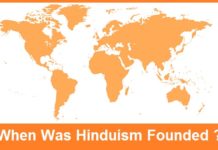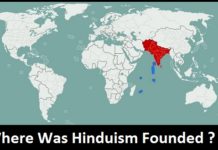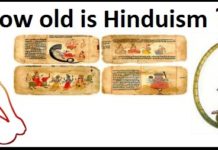Hinduism is understood globally as a religion, just like Christianity or Islam. There are people who consider Hinduism to be a polytheistic religion as well. None of these understandings are correct.
To understand Hinduism, we need to go deep into the history of mankind. Irrespective of whether man was created or evolved, his quest to know his own source has been happening from time immemorial. What is the source of all that he is seeing around? What is the source and destination of life? What is the goal of life? These questions form the base of whatever he has achieved – both spiritual and material.
In tackling with these questions, some people developed a concept of an ‘external god’ who creates and maintains this world. This was much an easy way to handle with the issue. Just assume a dictator outside and stay away from exploring truths oneself. The successors of these people developed and cooked more stories from already existing ingredients. Different recipes and combinations of these formed different religions. The other section of our society decided to explore the answers themselves.
There were two main modes of this quest – one was directed to the world outside, and other explored the world within (them). First group of people, who searched for an answer outside have reached what we see today – through modern science. The other group realized their own self – and found satisfactory answers to all the questions they needed. This (second) path of exploration and discovery is what is called spirituality or Indian philosophy. All sets of rituals, cultures, traditions and beliefs that originated from this path (emerged in ancient Bharatha) combines to form what is called Hinduism today.
The goal of life as identified by our ancient rishis (meaning seers) is self-realization and moksha. To make this happen for us, they have provided us with the Vedas or Upanishads and a systematic learning procedure through gurukulas and guru-shishya paramparas. The ultimate of what a man need to know is called Vedanta – which is nothing but the essence of Upanishads. At this stage, a person may wonder that if this knowledge or awareness was the ultimate goal of a human life, why is the path to moksha considered so difficult? To explain this, a person needs to understand a lot of other concepts. Without going that deeper, I would like to have a bird’s eye view of the scenario.
Not all human beings have the capacity to grasp the Vedantic knowledge (or any other knowledge for that matter) directly. Every individual is found to have their own levels of acceptance and understanding ability. It may vary a lot from person to person. So depending on the capacity of people to grasp knowledge, they are classified into various sections. All these classes of people require different approaches or paths to begin their journey to moksha – this is the principle of Hinduism.
Also Read :- Who is the Founder of Hinduism?
There are people who quickly understand the idea as and when they are taught. This is because of their sharp intellect, non-fluctuating mind and eagerness to harness knowledge. They are extremely few in number and are the ones ideal for learning Vedanta directly.
There are people who have a less power to grasp directly, but can understand through examples. Stories, analogies and examples are required for them to understand things correctly. So our rishis composed innumerable number of such stories and examples for aiding them.
There are people who have eagerness to learn, have a sharp intellect but their mind keeps on fluctuating – from one thought to another or there may be persons who possess other requirements, but have less developed brain cells. For such persons, the primary requirement is to stabilize their mind or make their brain cells active; whichever is required. Only after perfecting their intellect and mind can they be introduced into Vedanta. This is achieved through pranayama or yoga.
There are persons with even lower power of mind or intellect. They form the bulk of our population. They need to train their mind through meditations and other suitable methods as well as yoga and pranayama. This class of people can be subdivided into those who require external aid for meditations and those who don’t; or those who need the aid of sound vibrations (mantras) and those who don’t. There are people who lack the ability to visualize things through their mind. Just as a child counts with the help of his fingers, a person lacking this ability of visualizing needs visual aid to have their mind fixed. Vigrahas, temples and Pujas are advocated for them. So they need to practice from the lower stages to higher.
This is just a glimpse of the huge varieties of people and that much amount of paths needed to take them to the door of Vedanta and thus moksha. This is why Hinduism does not advocate a structured set of rules to be followed by all. A common path is impossible for all classes of the society. There will be diversities, and there should be! Hinduism is thus a combination of all the paths that man takes successfully to attain moksha, through Vedanta. In this manner, there are different classes of people who possess different qualities in different proportions. Hence, any method that they follow must suit their qualities. Ultimately, a person must attain a state of pure intellect and pure mind to understand Vedanta. All sorts of customs and rituals followed in Hinduism including pranayama, yoga, puja, murti system, etc are intended for different classes of people to make them attain this state. In this manner, Hinduism is a total “upliftment” strategy for all kinds of human beings to their ultimate common goal of self realization.
This is the idea behind the statement that Hinduism is not a religion. Irrespective of whether you are a follower of Jesus, Moses, David, Buddha, Mohammed, Guru Nanak, Chaithanya Mahaprabhu, Ramakrishna Paramahamsa, Bahá’u’lláh or any other great saints, you need this wonderful idea of Vedanta to get to your goal. This is how Hinduism stands out as the universal religion of all religions, if at all you want to call it a religion!



